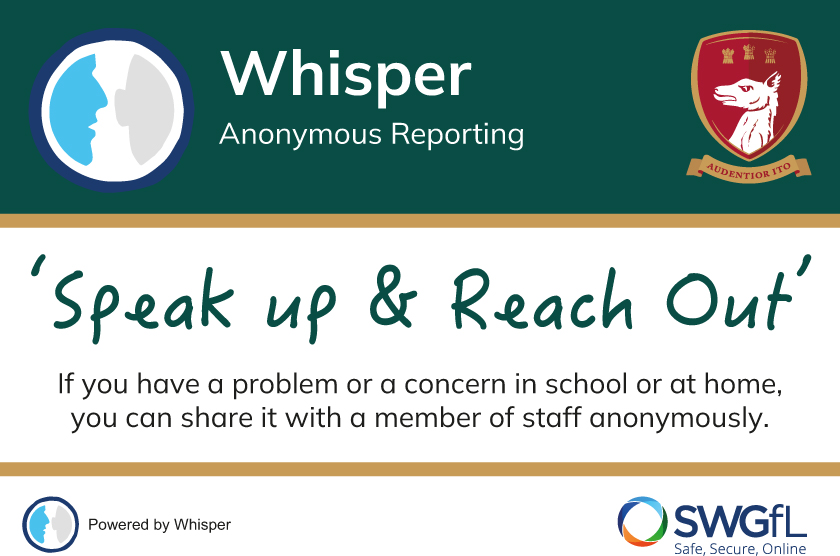 Message from the Headmaster: Post Half-Term Holiday
Published on 2nd November 2021
Message from the Headmaster: Post Half-Term Holiday
Published on 2nd November 2021
This week our Headmaster Mr Jenkinson launches the new ‘Whisper’ platform within the College, please read on:
Dear Parents
I have been following the news in the past few days about the launch of Mark Zuckerberg’s ‘Metaverse’.
Watching an initial teaser-video that shows how friends could meet for a chat and a game of cards, using personalised avatars in a virtual reality setting, integrated with augmented reality, I could not help but think that the future predictions of several science-fiction writers and film-makers had just come another step closer to us.
Both the global pandemic and the climate crisis have provided additional impetus to the pace of digital evolution, highlighting the need for human beings to find ways to communicate and connect with each other, without leaving the sanitised air and surfaces of our own living room or contributing to an even bigger carbon footprint by driving or flying.
Earlier this year, while some articles were persuasively analysing the psychological impact of ‘Zoom fatigue’, others were already describing active developments in the technology of holograms so that, rather than a board meeting be a collection of floating screen-heads in front of a carefully arranged bookshelf, people could project their full self into a room.
Apart from giving a business boost to the makers of formal trousers and shoes once more; since one’s hologram would need to be attired with full appropriateness for the meeting; hologram projections would certainly help everyone to read others’ non-verbal communicative cues – which actually constitute the majority of how we communicate, and explain why talking heads alone are so limiting and exhausting for our brains.
At the moment, avatars and Artificial Intelligence struggle with these non-verbal cues, since their design is programme, logic, and sequence-orientated; whereas human beings can be unpredictable, irrational, and implicit. A computer may pronounce the words “Thank you” in various languages, but the intuition is human and in the moment as to whether the tone and delivery of those two words will actually convey genuine and warm gratitude, or purposefully and ironically the exact opposite.
This is, and will remain, very hard for any micro-circuit to navigate effectively.
Our existence is rich in complexity and sophistication, and any perspective on this evolving future that takes a simplistic or binary view will overlook the multiple shadings and nuances in between, where most of our realities – whether actual, virtual, or augmented – reside.
We still ride bicycles, while welcoming the invention of self-driven, electric cars. We still use pens to write on paper, while recognising the benefits of voice-recognition technology and auto-correct. We still go for walks in the woods, inhale the country air, and listen to the sounds of nature; while having a place in our homes for a television with a film of the same outing.
In education, we refer to ‘hybrid’ (one activity across more than one location, facilitated by technology), and ‘blended’ (seamless transition between non-digital and digital resources). In our Leadership meetings (currently hologram-free) we discuss technological integration and innovation, as we look continually at how to prepare our pupils most naturally and effectively for the future ahead of them where, hopefully, balance in Life will still be maintained, while everything continues to change and evolve, around our pupils as much as because of them.
This week we launch the ‘Whisper’ platform in College.
It’s digital. It’s online. And it’s a way for pupils to share things with us, anonymously if they wish.
We know as a community that our College is very special in benefitting from excellent relationships between our staff and our pupils. The care, the warmth, the mutual respect – all are authentic and natural at Abbey Gate. Pupils know that they can, and do, talk to any one of us about anything, and that we have high levels of professional expertise and experience in being there for our pupils, to listen, help, and support.
But no school, just like no organisation of humans, is free from the occasionally uncomfortable impact of an individual’s choice of words or actions. What does matter is that, when there may be moments of unkindness or hurt, our ethos is not to shrug and dismiss these as unavoidable parts of Life, but to face them, with courage, principles, and open-ness, and to talk through how we can make the situation better again.
If a pupil is struggling themselves with something, or if they are concerned about another pupil, or even a member of staff, it takes significant personal strength to present in person at an adult’s office and speak about it.
Many do, but our ‘Whisper’ platform adds an additional option, which some pupils may be more comfortable with, allowing them to share what’s on their mind in a digital message, to which they may or may not put their name.
Based on whatever information is given to us, we can then take whatever steps may be appropriate to see if we can help. Importantly, we don’t want any one of our pupils to remain silent if there is actually something they need and want to share.
The ‘Whisper’ platform integrates a digital approach to communication, alongside the strong, relational practices we already have in our College. It encourages pupils to ‘speak up and reach out’; we hope they will, if otherwise they would not.
And then there are mobile phones. Further to all of the wellbeing reasons that we have discussed with pupils and were included in my previous message, it may also be helpful to clarify that we need, as a College, to move to a situation where pupils’ access to the internet is as reasonably regulated as possible by us, in loco parentis.
We also talk in education about ‘appropriate usage’ of technology. Enabling young people to have unrestricted access online with 3G or 4G on their personal phones throughout the school day is neither ‘appropriate’, nor is it helping them to learn how to use the vastness of the internet, with all of its benefits and its dangers, wisely and safely.
So, after our discussions with staff and with pupils, we will change behaviours from next Monday.
In our Senior School, pupils will be expected to turn their mobile phones off between 08.35 and 15.50, and they will be put away so that we will not see them around.
If any communication is so urgent that it cannot go through Reception, then the pupil will need to speak with a member of staff, who can then authorise use of the mobile phone on that occasion under reasonable supervision.
If a phone is to be used helpfully in a lesson, then the teacher, again, will authorise that and oversee appropriate usage.
However, the College does have its Virtual Learning Environment (VLE), group pages on MSTeams, and pupils’ own laptops that use the College Wi-Fi; so classroom resources and annotated slides can all be stored and shared on there for pupils to access whenever they wish.
Our Sixth Form are more mature in their neurological development and they will have permission to use their phones in the Sixth Form Common Room area, but not generally around school; we want them to role-model best behaviours for our inclusive and friendly College community, where we are aware of each other and where we look out for each other.
As with all summaries of policy and practice, there will be individual circumstances and exceptions for pupils that are not covered in the above.
Suffice to say that each will be managed with staff authorisation and appropriate, professional judgement.
However, the general shift will enhance our context of wellbeing and practices for safeguarding, as well as better support us, as a College, in planning and managing how we enable technological integration and innovation for our pupils; so that they can thrive and be happy in their future world, whether as themselves or their personal avatar.
Welcome back to the second half of our autumn term and thank you for your continued support.
Take care
Mr C Jenkinson





